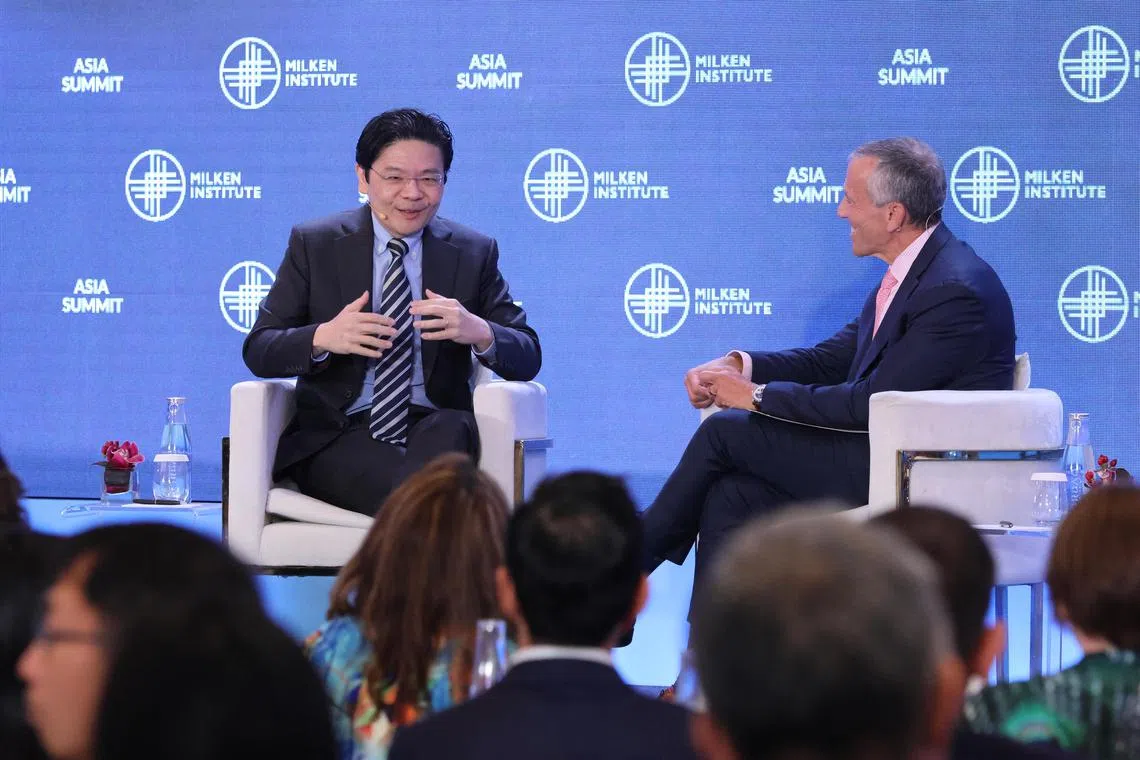Wealthy here should contribute to society, adhere to Singapore’s norms: DPM Wong
Sign up now: Get ST's newsletters delivered to your inbox
![CMG20230913-NeohKL01 梁麒麟/魏瑜嶙/ 10th Milken Institute Asia Summit: Global Investment Outlook [Four Season Hotel]
(A Conversation with the Deputy Prime Minister and Minister for Finance for Singapore, Lawrence Wong)](https://cassette.sphdigital.com.sg/image/straitstimes/5e6bc137bb6a0e038823ad82787709c48ea791569f59ca8b61ea656734ae78ca)
Deputy Prime Minister Lawrence Wong said the wealthy in Singapore are expected to “do their part, pay their dues and give back to society”.
PHOTO: LIANHE ZAOBAO
Follow topic:
SINGAPORE - The wealthy who park their funds in Singapore should contribute to society through taxes and philanthropy, and adhere to the country’s norms against ostentatious displays of wealth, said Deputy Prime Minister Lawrence Wong on Wednesday.
Speaking to a roomful of business leaders and policymakers, he added that Singapore’s interest in the financial flows into the country is not in the funds specifically, which are highly mobile. Rather, it is in building capabilities in the financial services sector and creating jobs for Singaporeans, to maintain the social compact.
Mr Wong was speaking on the first day of the three-day Milken Institute Asia Summit 2023, held at the Four Seasons Hotel Singapore, during a dialogue moderated by the institute’s chief executive Richard Ditizio.
The growth of the assets managed in Singapore to about $5 trillion and the establishment of some 700 family offices here have given a boost to the country’s asset management industry, but has also led to a perception of growing inequality, said Mr Ditizio.
Asked how Singapore manages this, Mr Wong, who is also the Finance Minister, said it was an issue the Government monitors carefully.
That Singapore has continued to attract investments, capital and talent amid a more turbulent global environment has been a positive thing, but such inflows can also bring about challenges, he acknowledged.
To mitigate against the downsides, the wealthy here are expected to “do their part, pay their dues and give back to society”, he said.
Elaborating, he said the family offices that set up shop in Singapore are encouraged to set up philanthropic arms and most do so, and the wealthy also contribute through taxes.
Noting that Singapore’s philosophy is a straightforward one in which everyone has to pay taxes, Mr Wong said “the rich pay more, and if you’re very rich, you pay very many taxes”, while those who are less well off benefit more from government spending.
Another thing the Government has done to address the perception of inequality, which is “not as easy as philanthropy or taxes”, is to engage the new arrivals to remind them about Singapore’s values and way of life, he added.
“We reach out to these groups, we tell them Singapore is an inclusive and egalitarian society. We are a place with an informal and egalitarian ethos where people can interact freely with one another comfortably as equals, where we frown on ostentatious displays of wealth,” he said.
“So these are our house rules. If you’d like to be here, please follow our norms, follow our rules. If you think they are not for you, that’s okay. You can take your money and you can go elsewhere. We won’t hold it against you,” Mr Wong said to laughter from the audience.
At the same time, the Government had worked to ensure that hot foreign monies do not flow into the residential property market and make housing unaffordable for Singaporeans. To this end, there are very strict rules governing the sale of property to foreigners and the rules have been tightened twice in the last three years, he added.

Deputy Prime Minister Lawrence Wong at the Milken Institute Asia Summit 2023, during a dialogue moderated by the institute’s chief executive Richard Ditizio.
PHOTO: LIANHE ZAOBAO
Ultimately, maintaining the social compact and keeping society strong and united are vital for the continued support of Singapore’s economic model, he said.
“We are very fortunate in Singapore to start with a very high level of trust and a strong sense of solidarity in our society, and we are determined to do everything we can to keep it that way,” Mr Wong added.
This is done through ensuring real income growth and continued improvements in the standard of living for the broad middle of society and tackling challenges of inequality and social mobility, which are becoming sharper as society matures and the population ages, he said.
Efforts in these areas have seen good results in recent years, added Mr Wong, citing how median incomes have been rising in real terms after netting off inflation which has been higher, and how lower-income groups have enjoyed higher income growth compared with the rest of the workforce.
The Forward Singapore exercise
“It will entail more government spending, more investments in workers, in our human capital, but it will be spending well worth making and investment well worth making in order to keep our society strong and united, and to continue to get sustained support for our economic model which is open, vibrant, competitive and vital for Singapore’s success,” he said.
During the wide-ranging dialogue, Mr Wong and Mr Ditizio also discussed the changing geopolitical backdrop, how Singapore has continued to attract investments, and challenges brought by climate change and artificial intelligence.


